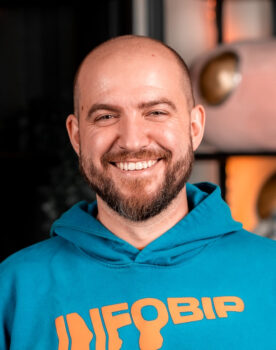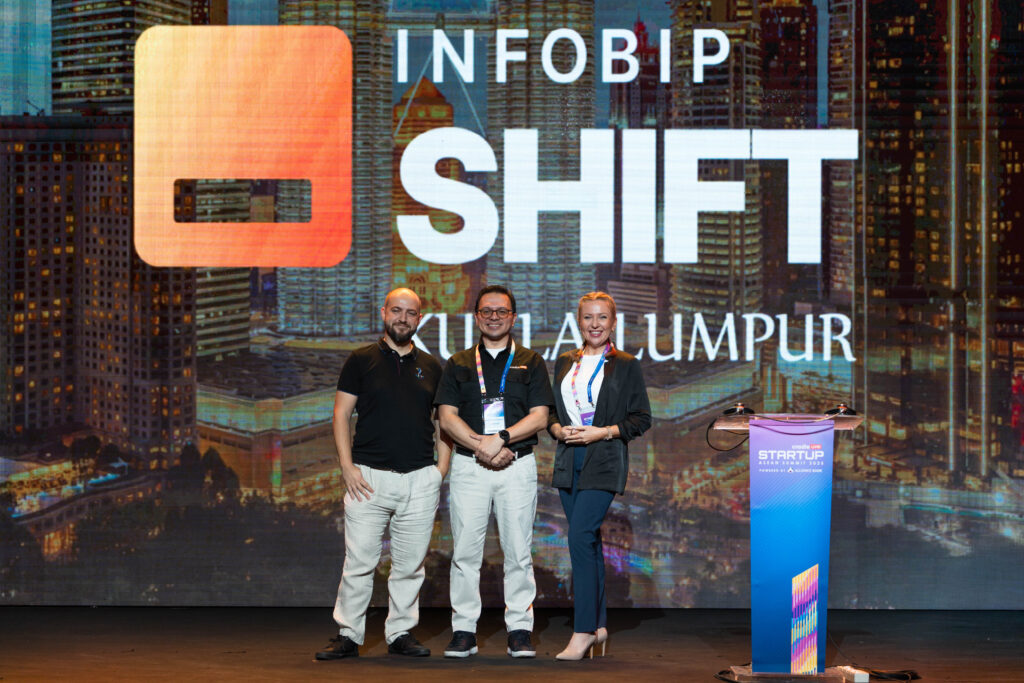Editor’s note: TNGlobal is a media partner of Cradle LIVE! Startup ASEAN Summit 2025
Earlier this month, Infobip Shift, one of the most attended developer conferences, was held in Asia for the first time, in Kuala Lumpur, Malaysia. The conference aimed to connect developers, startups, and tech leaders across Southeast Asia, fostering knowledge exchange on AI, software development, and innovation.
This edition of the conference also marked Infobip Shift’s expansion to a third continent within the same year, following events in Zadar and Miami, positioning it as a truly global developer platform.
The Kuala Lumpur event was part of Cradle LIVE! Startup ASEAN Summit 2025, organized in partnership with the Cradle Fund, Malaysia’s focal agency for early-stage startups.
TNGlobal recently talked to Ivan Brezak Brkan, Developer Experience Director at Infobip, to learn more about the event, the company’s strategic vision for the Southeast Asian market, how is Infobip helping developers and startups, among others. Infobip is a global communications platform for businesses and developers headquartered in London.
 Below are the edited excerpts of the interview:
Below are the edited excerpts of the interview:
Why Southeast Asia, and why now? After successful editions in Croatia and Miami, what specific factors made the timing and location of Kuala Lumpur ideal for Infobip Shift’s Southeast Asia debut?
Short answer: The Southeast Asia developer community deserves a great developer conference!
Long answer: After successful editions in Zadar and Miami we realized we have the programming, team, and experience expand to Southeast Asia, which has been our goal for a long time. In coordination with our colleagues from the APAC region, we chose Kuala Lumpur as an ideal host city because of its booming tech scene, and growing developer and startup community.
What is Infobip’s long-term strategic vision for the Southeast Asian market, particularly with this event as the starting point? What are Infobip’s expansion plans in Malaysia or across Southeast Asia?
Our plan with Infobip Shift Kuala Lumpur is to make it a recurring developer and startup conference, one that will grow and give tech builders in the region access to the latest knowhow and trends in technology, such as Agentic platforms and AI-enabled engineering.
In Croatia, Shift is a large event with more than 4,000 attendees and more than a hundred speakers. More importantly, whether it’s Zagreb or Kuala Lumpur – Shift connects developers and the community on a global level.
As far as Shift, we want to connect to the Southeast Asia tech and startup community, so whether you’re a VC, government tech organizations or startup community – please get in touch.
How do you see the local developer and startup ecosystems in ASEAN differing from those in Europe or the US, and how has the Infobip Shift agenda been tailored to meet those unique needs?
We see developers globally as a part of the same family. There are differences but the main challenges that they face are similar.
Primarily, that is the mix of uncertainty and excitement brought on by the sudden and unstoppable explosion of AI technology. You can read almost daily about huge companies laying off developers because of AI, and that is something that developers think about, something that worries them. That is why our theme was centered around AI and software development, as we want to offer developers a chance to expand their knowledge and stay at the forefront of innovation.
We did not make any specific adaptation in the agenda, but we did, however, have more speakers from the SEA region (compared to Miami for example) as we wanted to offer speakers from the region a chance to share their ideas and opinions on stage.
What specific, quantifiable goals does Infobip hope to achieve in the region over the next 1-3 years as a result of this debut?
Our focus over the next few years is to build a sustainable and long-term presence in Southeast Asia by strengthening relationships with local developer and startup ecosystems.
Through Infobip Shift, we aim to create a platform that continuously drives collaboration, learning, and innovation across the region. This event marks the beginning of a broader strategy to connect regional talent with global opportunities, position Infobip as a trusted technology partner, and contribute to the overall growth of the digital economy in Southeast Asia.
Infobip is known for its global platform. How does this partnership with Cradle Fund, a key player in the Malaysian ecosystem, help bridge local startups with global opportunities?
Infobip has its own Startup Tribe, a program that allows startups from around the world to use Infobip’s services as they scale their business. Partnership with Cradle is in that way logical because it opens the door to the wider startup community and allows us to reach startups that would be hard to get in touch with otherwise.
On the example of Shift, I can say that working with Cradle has helped us reach our goals and it would be really challenging to that without them.
On behalf of the Infobip Shift team, I want to thank the Cradle team for all their help. We have already started discussing options of bringing Malaysian startups to Shift in Croatia. This is for now just an idea, but I believe it’s a great opportunity to bridge the gap between Malaysian startups and Europe.
What are the one or two key themes or technologies (e.g., AI, LLMs, CPaaS) that Infobip is focusing on at this SEA edition, and why are they particularly relevant to ASEAN startups?
As I said, we believe developers globally share the same concerns and that is why we chose the theme of intersection AI and software development. From LLMs to Copilots, this is the tech that is rapidly transforming (disrupting) the industry and changing what it means to be a developer. This is a theme that is relevant to developer from all over the world and not something that is limited only to one particular region.
We always try to offer the developer community exactly what it wants to hear about, so we will stay in tune with them and tailor the agenda of the next year edition based on what we learn.
How is Infobip helping developers and startups navigate the ethical and practical challenges of implementing cutting-edge technologies like AI into their products and services?
We see AI as a tool that should empower people, not replace them. That’s why we always talk about responsible and transparent AI — technology that improves how we work, but still keeps humans in control. Through Shift, we want to open that discussion with the developer community and help them think not only about what AI can do, but also about how it should be used.
Developers today are not just building apps, they’re shaping how people interact with technology. That’s a huge responsibility, and we want Shift to be a place where that responsibility is acknowledged, discussed, and turned into better, more ethical products.
As Croatia’s first unicorn, what lessons from Infobip’s own journey from a startup to a global leader do you plan to share with the founders and builders attending the summit?
For Infobip Shift, we are focused primarily on developers and on the practical insights that can help them with their careers. The idea of Shift is to strengthen and gather the developer community, and I think this honesty is something that developers recognize and appreciate. We are not here to sell you Infobip, we are here to help you with your career and connect you with peers.
However, the Infobip story is one of innovation, resilience, and growth. Our CEO, Silvio Kutić, offers this advice to entrepreneurs: “Do not be deterred by the conventional wisdom that success requires massive external funding. The true measure of success is not the amount of capital you can raise, but the value you create through innovation and perseverance. Trust in your vision, be resourceful, and remember that every challenge is an opportunity to learn and grow.”


